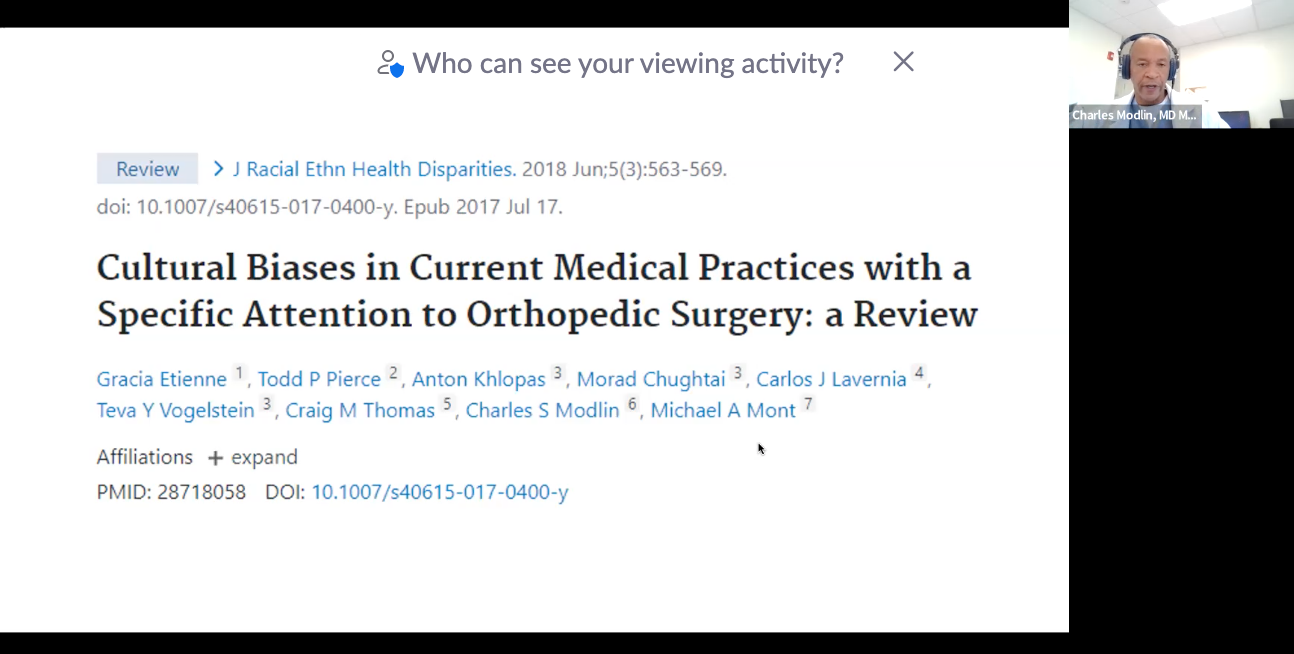MetroHealth Equity, Inclusion, and Diversity Leadership Led Post-Screening Discussion
This article is a part of our CTSC event recap series.
On Tuesday, October 4, 2022, over 100 MetroHealth caregivers and community members watched The Color of Care documentary and 86 tuned in for the virtual post-screening discussion featuring equity, inclusion, and diversity leaders Dr. Charles Modlin, Medical Director, Equity, Inclusion, and Diversity, Alan Nevel, MBA, Senior Vice President and Chief Equity Officer, and Margarita Diaz, MSN, RN, Director, Equity, Inclusion, and Diversity.
Dr. Modlin presented on health disparities, including race, genetic ancestry, and estimating kidney function in chronic kidney disease. “MetroHealth has gone away from using the race-based coefficient in calculating the eGFR,” said Dr. Modlin. Even more disturbing, Dr. Modlin highlighted the effect of oral health disparities and toxic stress and on children’s health. Dr. Modlin explained one fact that relates to social determinants of health and their intersection with health disparities is the fatal drowning rate for Black kids. Segregation of public pools attributed to the fact that among kids ages 11-12, African Americans are 10 times more likely to drown than their white counterparts.
Where race-based medicine has had its faults historically, Dr. Modlin supports race in health for the following reasons:
- Hereditary predisposition for some diseases in minorities; and
- Race used as a surrogate marker for disease likelihood.
He explained that race should be used responsibly in consideration of disease prevention and health screenings (e.g., differential screening recommendations by race, like prostate cancer) and disease treatment.
MetroHealth is anchored in the community. “Our mission is about people. It has been for 185 years,” Diaz declared. Dr. Modlin is spearheading several upcoming efforts at MetroHealth. One example, Dr. Modlin explained, is that they are “[…] going clinical service line by service line, department-by-department, specialty-by-specialty, and looking at health disparities that are more likely to occur—whether it’s in endocrinology […] lung, GI, neurology, stroke—each one of these areas exhibits certain higher rates of disease along racial/ethnic lines.” They are developing Multicultural Health Centers of Excellence and inviting all caregivers in the health system to play a significant role in identifying problems and developing solutions.
Nevel talked about things that MetroHealth did that were considered best practice to help with COVID-19 vaccine uptake, including leveraging employees of color to share their “why” and partnering with faith communities to deliver trustworthy information about the disease and importance of vaccination. “Spirituality still remains a key focus in many communities,” Nevel added. By going into the community and meeting people where they were, MetroHealth was able to screen numbers of patients that were unheard of early on in the pandemic.
“I looked at the chat and at its peak we had 86 participants. […] If what you saw over the last nearly two-hour experience upset you […] left you feeling sad, depressed, whatever human emotion you felt, I think it’s all summed up into man’s inhumanity against man […] if there are 86 of us on this call, if each of us reaches five people and they reach five people and so on, we can touch and we can truly impact healthcare disparities in greater Cleveland very quickly—I did the math, that’s 67% of greater Cleveland. It’s really up to all of us,” Nevel proclaimed.
“The call to action starts with you. The first step is: ‘What are you going to do?’ It is an overwhelming situation. We can’t boil the ocean. It is overwhelming to resolve, but as Alan said, each person can impact their sphere of influence,” Diaz professed.



